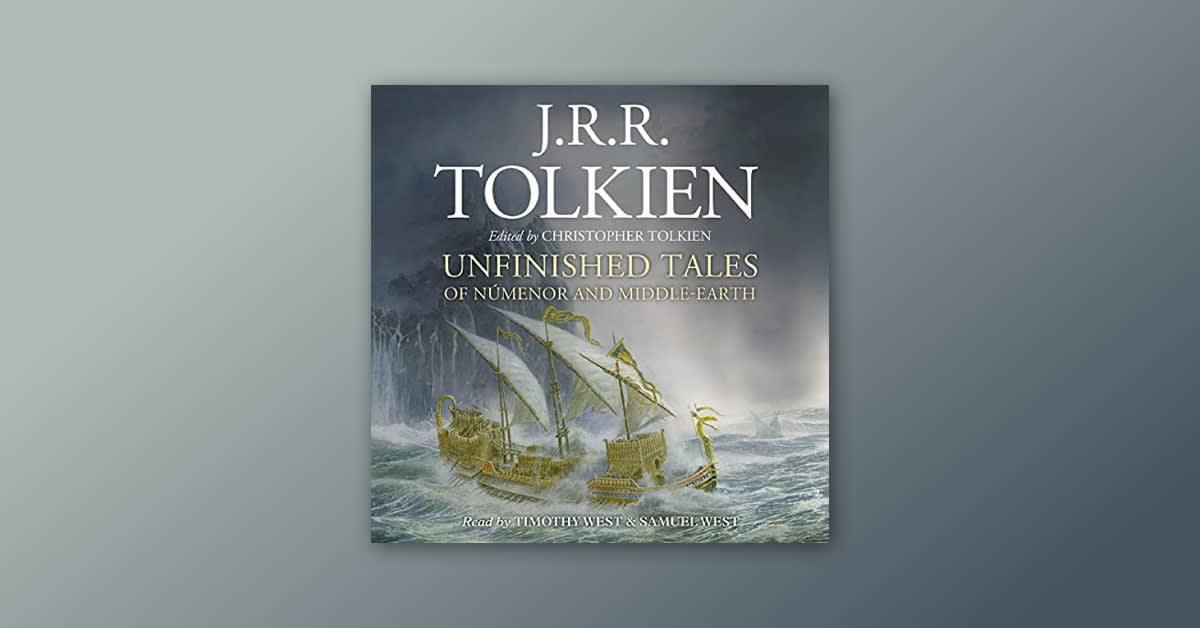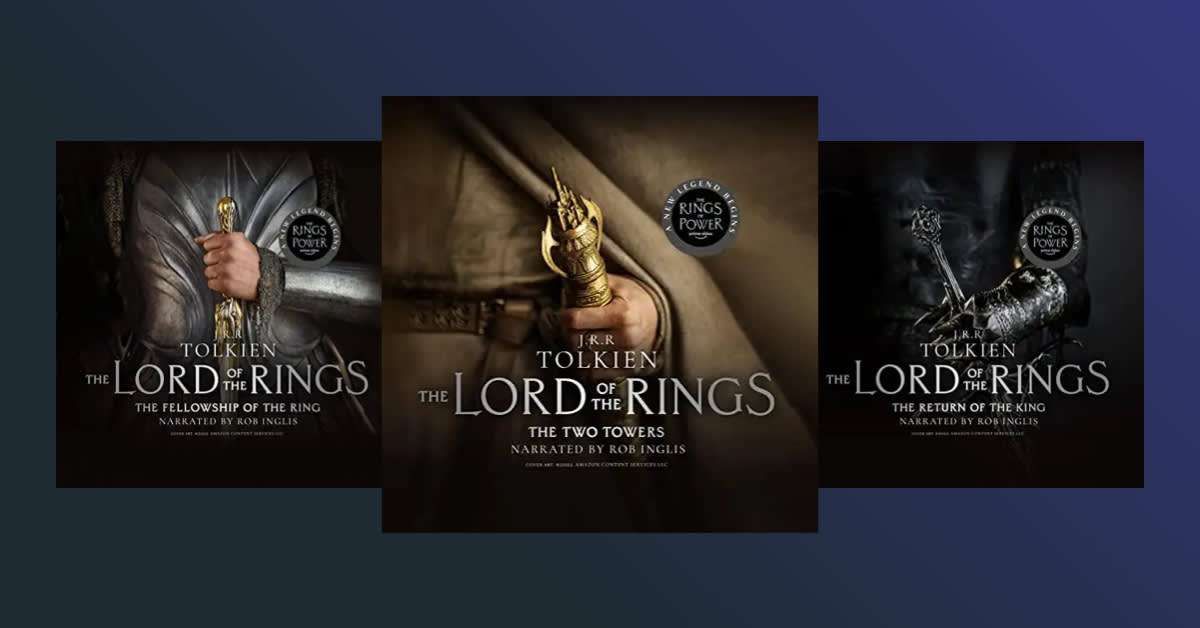If you love J.R.R. Tolkien's The Lord of the Rings, then you know that all of the events of the story would be impossible without the half-Elf Elrond. Elrond, the Lord of Rivendell, lived in Middle-earth from the First Age to the beginning of the Fourth Age. It was with the help of Elrond that the evil Sauron was defeated and alliances were forged. Elrond is one of the most prominent characters throughout Tolkien's stories, appearing in The Silmarillion, The Hobbit, Unfinished Tales, and, of course, The Lord of the Rings. But who is he and what is his story?
Who is Elrond?
Elrond Half-elven was born in the Havens of Sirion in Beleriand, late in the First Age. His father was Eärendil, a great half-elven mariner who carried a star across the sky at the end of the First Age. Elrond's mother was Elwing, also known as Elwing the White, also half-elven. Elrond had a twin brother, Elros, also known as Elros Tar-Minyatur.
Lord Elrond is said to have hair as "dark as the shadows of twilight" and gray eyes that shine like starlight. In The Hobbit, Elrond is described as follows: "He was as noble and fair as an Elf-lord, as strong as a warrior, as wise as a wizard, as venerable as a king of dwarves, and as kind as summer." Elrond appears neither young nor old, but despite his seeming agelessness, it is clear that the half-Elf has experienced much and knows many things.
Elrond Through the Ages of Middle-earth
The First Age
Elrond and his twin brother Elros were born late in the First Age to Eärendil and Elwing. When Elrond and his twin were only six years of age, they were kidnapped by Maedhros and Maglor, the only sons of Fëanor to survive the assault upon the Havens. Elrond and Elros were then abandoned in a cave, but Maglor took pity on them, took them in, and raised the twins as his own. At the end of the First Age during the War of Wrath, the Valar gave Elrond and Elros the choice of being counted among the kindred of Elves or Men. Elrond chose to be counted among the Elves, and Elros chose to become mortal. This is where the twins' stories diverge. Elros journeyed to Númenor to follow the star of Eärendil. Meanwhile, Elrond remained among the Elves in Lindon with Gil-galad, the fourth and last High King of the Noldor. There, Elrond developed his healing powers.
The Second Age
At the beginning of the Second Age, a being calling himself Annatar sought entrance to Lindon. Sensing that Annatar was not what he seemed, Elrond and Gil-galad denied him access. Their intuition was correct, as Annatar later turned out to be Sauron, the most trusted lieutenant of Morgoth. During the War of the Elves and Sauron in SA 1695, Gil-galad sent Elrond to Eregion to protect the Elven kingdom from the invading forces of Sauron. But he arrived too late and was not able to defeat Sauron's army. Elrond retreated north with the refugees of Eregion, and over the next two years, he founded Rivendell, a sanctuary at the feet of the Misty Mountains. Rivendell was able to prosper over the next several years with the aid of Vilya, the Ring of Air, which Gil-galad gave to Elrond. Elrond marched with Gil-galad and Elendil during the War of the Last Alliance. Gil-galad, Elendil, and his younger son Anárion died during the war. This left Elrond and Círdan as the commanders of the Elves, and Isildur as High King of the Realms in Exile. When Elrond discovered that Isildur had claimed Sauron's One Ring as his own, he urged him to destroy it. Lured by the Ring's powers, Isildur refused. At the end of the Second Age, Elrond returned to Rivendell.
The Third Age
At the beginning of the Third Age, Elrond married Celebrían, daughter of Galadriel. They had three children: twin sons, Elladan and Elrohir, and a daughter, Arwen. Elrond's marriage to Celebrían ended in tragedy. Celebrían was traveling to Lothlórien when she was captured by Orcs and tormented by them. Her sons eventually found and rescued her, but by then, Celebrían had received a poisoned wound, and she was never able to fully recover. Celebrían left her family behind and sailed west to the Undying Lands. Later in the Third Age, Elrond harbored the heirs of Isildur, including Aragorn II, whom he raised as his own son. Aragorn only became aware of his royal lineage when he came of age and Elrond told him about his birthright. Soon after, the news that Aragorn was betrothed to Arwen brought Elrond sorrow, knowing that his half-Elf daughter would have to choose mortality to wed the man she loved. Elrond was also a member of the White Council, which was held in Rivendell. Elrond held the Council where it was decided that the One Ring should be destroyed, and he helped to select the members of the Fellowship that would join Frodo and Sam on their quest to destroy the Ring. After the Ring was destroyed at the end of the Third Age, Elrond left Middle-earth on the White Ship to Valinor along with Frodo, Gandalf, and the other Ring-bearers.
Elrond's Alliances and Relationships
Arwen
Also known as Arwen Undómiel or "Evenstar," Arwen is the half-Elf daughter of Elrond and Celebrían. Arwen is in love with Aragorn II, but Elrond disapproves of the relationship, mostly because he knows that marrying Aragorn would mean Arwen would have to choose a human life of mortality. Elrond said that he would not permit the couple to marry until Aragorn had taken the thrones of Arnor and Gondor. After Aragorn fulfilled these requirements, Elrond was present at the wedding to give his daughter away to the new king.
Celebrían
Elrond was married to Celebrían at the beginning of the Third Age. The couple had twin sons, Elladan and Elrohir, and a daughter, Arwen. Following the ordeal of being captured, tormented, and poisoned by Orcs, Celebrían sailed to the Undying Lands, never to return.
Maglor
Maglor, the second son of Fëanor and Nerdanel, kidnapped Elrond and his twin brother, Elros, and raised them as his own sons. Despite the violent beginnings of their relationship, Maglor eventually grew to love Elrond and Elros, and he became a father figure to them.
Elros
Elros, also known as Elros Tar-Minyatur, is the twin brother of Elrond. Unlike Elrond, Elros chose a life of mortality and the two brothers parted ways. Elros started ruling Númenor at the age of 90 and lived a long life, dying at the age of 500 in SA 442, after ruling Númenor for a long 410 years.
Isildur
Isildur and his brother Anárion founded and jointly ruled Gondor. Along with Círdan, Elrond witnessed Isildur cut the One Ring from Sauron's hand—and his choice to keep the Ring for himself. Elrond tried to convince Isildur to destroy the Ring, but he refused.
Gil-galad
Gil-galad was the last High King of the Ñoldor in Middle-earth. He formed the Last Alliance of Elves and Men alongside King Elendil, and he led the Elves to war against Sauron during the Second Age. The Ñoldorin prince Celebrimbor gave Gil-galad the Elven Rings Vilya, the Ring of Air, and Narya, the Ring of Fire. Gil-galad gave Narya to Elrond for safekeeping. After Gil-galad's death in battle, it was argued that Elrond was Gil-galad's rightful heir, but Elrond refused to take his place on the throne.
Galadriel
Galadriel is one of the most powerful Elves of all time and the mother of Elrond's wife Celebrían. Galadriel was also a member of the White Council, which was held in Rivendell. As members of the White Council, Elrond became close allies with Galadriel, and when Galadriel departs Middle-earth at the end of the Third Age, Elrond goes with her.
Aragorn
At two years of age, Aragorn II was brought to Rivendell and raised by Elrond. Aragorn's mother was afraid for her son's life, and so Elrond kept Aragorn's lineage a secret from him until he was older. Although Aragorn was deeply in love with Elrond's daughter Arwen from the first time he laid eyes on her, Elrond forbade their marriage until Aragorn could be king of both Gondor and Arnor, thereby uniting the kingdoms once more.
Gandalf
Gandalf is a Wizard and another important member of the White Council—and therefore, another important ally to Elrond. Gandalf and Elrond worked together to save the Hobbit Ring-bearer Frodo from the Nazgûl by enchanting the water to send them away. Gandalf also agreed with Elrond that the One Ring must be destroyed in the fires of Mount Doom. When Elrond chose the members of the Fellowship of the Ring that would take this journey to Mount Doom, Gandalf was appointed the leader.
Elrond's Powers and Abilities
Elrond is a very powerful Elven being, most renowned for his unrivaled healing powers. Elrond is also well-known for his great wisdom and foresight. Additionally, he has many powers that stem from Vilya, the Ring of Air, which Gil-galad gifted to him. Elrond's Ring gives him the ability to enchant rivers, which helps him save Frodo during his journey with the One Ring. The Ring also allows him to put up protective boundaries to ward off evil. Elrond uses this power to keep Rivendell a safe haven in times of war.
What is The Council of Elrond?
The Council of Elrond was an important meeting held in Rivendell, which took place during the events of the first Lord of the Rings novel, The Fellowship of the Ring. The Council was led by Elrond on October 25th, TA 3018. The Council's main purpose was to determine what to do with the One Ring, which was brought to Rivendell by the Hobbit Frodo Baggins. In addition to Elrond, many prominent figures were known to be present at the Council, including Gandalf; Frodo Baggins; Bilbo Baggins; Glorfindel, a Noldo who helped Frodo travel to Rivendell; Erestor, an adviser of Elrond's household; Aragorn II; Boromir, son of the Steward of Gondor; Glóin, a dwarf of Durin's Folk, and his son Gimli; Legolas, a Sinda Elf and the prince of the Woodland Realm of Mirkwood; and Galdor of the Havens, a messenger of Círdan.
The Council began with a discussion of the history of the One Ring, mostly as told by Elrond and Gandalf. Boromir suggested that the Ring could be used against Sauron to overthrow him. However, Gandalf and Elrond disagreed with this plan, arguing that the Ring would corrupt whoever tried to use it. The Council also discussed the fact that the Ring would only be able to be destroyed where it was created—in the fires of Mount Doom.
So, the Council agreed: the only way to be rid of the ring was to cast it into the fires, and Frodo Baggins was the one to carry out this mission. Over the next two months, Elrond and the rest of the Council made decisions about who would accompany Frodo on this momentous journey. Elrond seized on nine as the best number for the company, as "nine walkers" could counter the "Nine Riders," otherwise known as the Nazgūl or Ringwraiths. And so it was decided that the nine would be Frodo, his friend Sam, Gandalf, Aragorn, Boromir, Gimli, Legolas, and two more Hobbits: Merry and Pippin.
Best Elrond Quotes
“For Isildur would not surrender it to Elrond and Círdan who stood by. They counselled him to cast it into the fire of Orodruin night at hand … But Isildur refused this counsel, saying: 'This I will have as weregild for my father's death, and my brother's. Was it not I that dealt the Enemy his death-blow?' And the Ring that he held seemed to him exceedingly fair to look on; and he would not suffer it to be destroyed.” — The Silmarillion
“In all the days of the Third Age, after the fall of Gil-galad, Master Elrond abode in Imladris, and he gathered there many Elves, and other folk of wisdom and power from among all the kindreds of Middle-earth, and he preserved through many lives of Men the memory of all that had been fair; and the house of Elrond was a refuge for the weary and the oppressed, and a treasury of good counsel and wise lore. In that house were harboured the Heirs of Isildur, in childhood and old age, because of the kinship of their blood with Elrond himself, and because he knew in his wisdom that one should come of their line to whom a great part was appointed in the last deeds of that Age. And until that time came the shards of Elendil's sword were given into the keeping of Elrond, when the days of the Dúnedain darkened and they became a wandering people.” — The Silmarillion
“It is perilous to study too deeply the arts of the Enemy, for good or for ill. But such falls and betrayals, alas, have happened before.” — Elrond, The Fellowship of the Ring
“Let him not vow to walk in the dark, who has not seen the nightfall.” — Elrond, The Fellowship of the Ring
"Such is oft the course of deeds that move the wheels of the world: small hands do them because they must, while the eyes of the great are elsewhere." — Elrond, The Fellowship of the Ring
“Then Elrond and Galadriel rode on; for the Third Age was over and the Days of the Rings were passed and an end was come of the story and song of those times.” — The Return of the King





